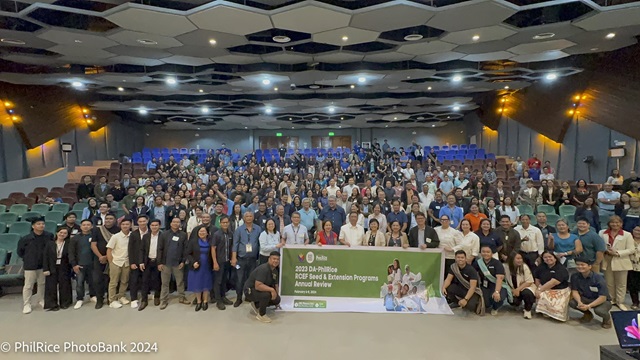
Amidst the country’s feat of achieving the highest rice yield of 20.06 million metric tons in 2023, Sen. Cynthia A. Villar lauds implementers of the Rice Competitiveness Enhancement Fund (RCEF) programs led by Philippine Rice Research Institute (PhilRice).
“Thank you, PhilRice, for [always giving your best efforts]. With this gain in rice production, I urge you to continue supporting our farmers to be more competitive,” Villar, also the committee on agriculture and food, said during the recent RCEF annual review held in Science City of Muñoz, Nueva Ecija.
As a show of sustained backing, Villar announced the possible extension of the RCEF programs after this year to reach the target average yield of 6t/ha. Current average yield is less than 5t/ha.
Meanwhile, PhilRice Executive Director John C. De Leon noted the contributions of the RCEF Seed and Rice Extension Services programs.
“We recognize the commendable initiatives of the dedicated RCEF implementers. Thank you for your unwavering commitment to advancing our agricultural sector, which has not only increased rice competitiveness but has also contributed in attaining this record,” he said.
Implementers reported that seed recipients increased their average yield as shown in the midterm and seasonal monitoring and evaluation surveys conducted in the 42 original target provinces of the RCEF Seed Program.
In the dry season 2023, their average yield increased from 3.63t/ha in 2019 to 4.36t/ha while the use of the recommended packages of technology in PalaySikatan demonstration sites reached an average of 5.22t/ha.
Data from Rice Seed Monitoring System (RSMS) as of Jan. 21 showed that 15.85 million bags of certified seeds were distributed from the 2020 dry season to the 2024 dry season, benefitting over 2 million farmers.
Under the Seed Program, PalaySikatan technology demonstrations were established in 704 sites, more than 400 cities/municipalities were given site-specific recommendations, digital innovation such as RSMS and Binhi e-Padala were improved for easy distribution and monitoring of seeds.
Meanwhile, the Training of Trainers on Pest and Nutrient Management under the RCEF Rice Extension Services Program implemented by PhilRice significantly enhanced the participants’ farming practices, boosted their confidence in technology dissemination specifically focusing on pest and nutrient management technologies, and empowered them to actively engage in conducting training activities.
Implementers said that each region now has 25-48 rice experts who will help farmers diagnose field problems while more than 4,300 graduates of training of trainers nationwide now teach farmers and setting-up varietal trials in more than 300 farm schools. More than 4,000 farmers were also trained on production of high-quality inbred rice and farm mechanization and on pest and nutrient management.
The seed distribution activities and training courses were also complemented with more than 5 million copies of IEC materials that were produced and distributed nationwide and with various formats of knowledge sharing and learning activities reaching at least 18 million rice farmers, intermediaries, and other stakeholders.
Study among 154 farmer-beneficiaries showed the printed material that was distributed during the 2020-2021 seed distribution was being read. Half of them mostly adopted the contents on nutrient management, land preparation, seedbed preparation and seedling management, and harvesting that increased their yields, improved their farming practices, and reduced their cost.




